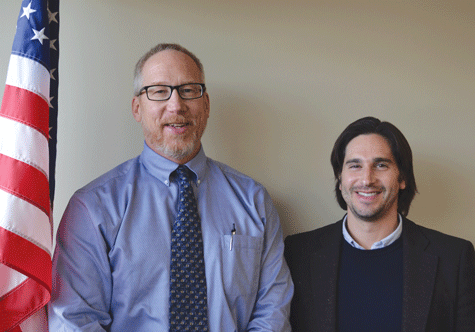by MAX SPARBER
Community News Editor
In the wake of the Oct. 27 mass shooting in Pittsburgh, which killed 11 worshippers from the Tree of Life – Or L’Simcha Congregation, Jewish institutions are struggling with questions of security.

There is the question of how a synagogue can be open and welcome to worshippers while also screening for potential threats. There is the question of how much visible security is needed to make congregants feel safe, and how much might contribute to a sense of unease — especially among Jews of color, who have pointed out that increased security has a history of making them less safe. (Journalist Nylah Burton forcefully made this case with her article “As a Black Jew, I’m Begging You: Don’t Arm Your Synagogue,” published on heyalma.com.
Additionally, there is an enormous cost that comes with increased security. Ben Sales of JTA broke down the costs in a Nov. 13 article, interviewing Rabbi Yakov Saacks, who recently increased security to the Chai Center in Dix Hills, NY. Saacks estimated that increase in physical protection, such as security guards, had added $150,000 to his budget, plus costs for cameras and shatterproof glass windows, partially offset by a $50,000 grant from New York state.
These are daunting questions for a Jewish institution, especially the smaller ones that may not have this sort of budget.
The Jewish Community Relations Council: Minnesota and the Dakotas has a long history of tracking anti-Semitism and related hate crimes in the region, and their work has included facilitating education in community security. But, as a Nov. 12 article in the Star Tribune detailed, they have recently stepped up their efforts.
The story detailed a new hire at the organization, retired Plymouth Deputy Chief of Police Dan Plekkenpol, as he visited St. Paul’s Mt. Zion Temple. Plekkenpol walked through the building, asking questions of their procedures and answering security questions.
American Jewish World sat down with Plekkenpol and the JCRC’S director of communications and community security, Anthony Sussman, to discuss the hiring of Plekkenpol.
Sussman explained that the organization had discussed having a full-time, dedicated director of community security for several years. Previously, Sussman had been responsible for tracking anti-Semitic incidents and arranging for training, along with his responsibilities as director of communications. “We’ve essentially been outsourcing all that training, whether that be with the FBI, whether that be with private security personnel in town,” Sussman explained. “So we were looking, with Dan, to bring that in house and to enhance our offerings to the community.”
Plekkenpol brings a wealth of experience, having been emergency manager of the city of Plymouth, as well as having organized in emergency response training programs, such as the Crime Free Multi-Housing Program, which involves, in part, extensive risk assessment procedures designed to keep illegal activity off of rental property.
Beyond that, Plekkenpol stresses that his greatest value is availability. He has almost run out of business cards that allow people to call him directly, as he has been passing them out to anyone he meets with in the Jewish community, and in the short time he has been in the job he has been meeting extensively with members of the local Jewish community. In an emergency, he explains, you can “spin your wheels if you don’t know who to call at two in the morning.”
Plekkenpol doesn’t offer easy answers to the question of security. “I would be easy to say there should be armed guards at every synagogue,” he said. “I don’t know that that’s the right answer.”
Instead, his approach is to meet with institutions and discuss their current security and their needs, and then offer suggestions. As to the question of balancing increased security needs with institutional budgets and philosophies, Plekkenpol leaves that to the individual institutions to decide what they can afford and what amount of security is right for them.
Plekkenpol also highlights the importance of communicating with the JCRC. The organization has a hotline number for reporting anti-Semitic incidents (612-338-7816, or email by email at info@minndakjcrc.org.) JCRC tracks these incidents and communicates with law enforcement, as well as with local Jewish organizations.
(Sussman shared with American Jewish World the latest stats — as with the rest of the country, anti-Semitic incidents have gone up in Minnesota, 17 reported incidents this year; last year there were 28, compared to eight total in 2012. Fortunately, none of these have been violent, but the JCRC tracks vandalism, property destruction, harassment and intimidation.)
“Report anything suspicious,” Plekkenpol said, describing even insignificant incidents as potentially being a “tentacle” of something larger. The JCRC, with its greater access to hate crime data and instructional support, has a greater ability to put incidents in context and determine if they are isolated or if there is a larger story that should be investigated.
“Reporting suspicious behavior is huge,” Plekkenpol said. “In active shooter situations it was known that the shooter did their homework.” He described shooters as visiting the locations they targeted, even going inside before returning with guns. Plekkenpol recomments reporting anything “that doesn’t fit, something odd in behavior — and I’m saying report the behavior and not the person.”
In the case of previous shooters, Plekkenpol asks: “Could something be thwarted? Possibly so. It’s been proven in the past.”




















